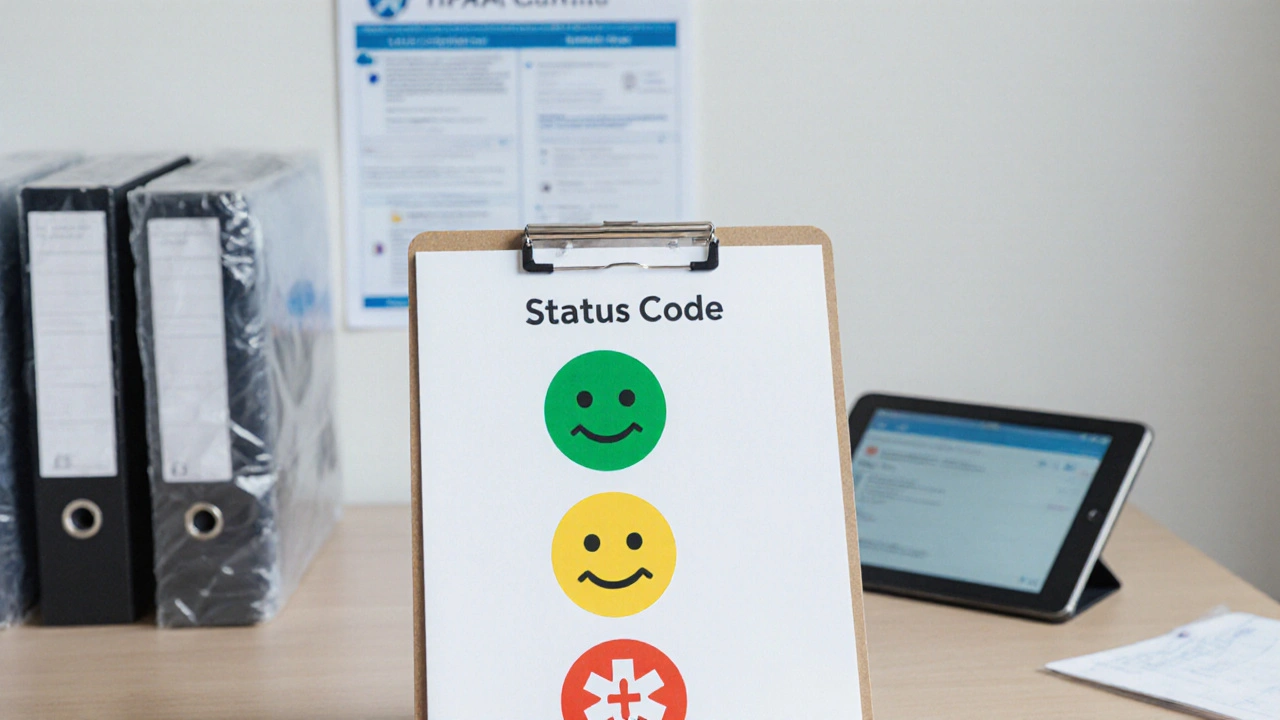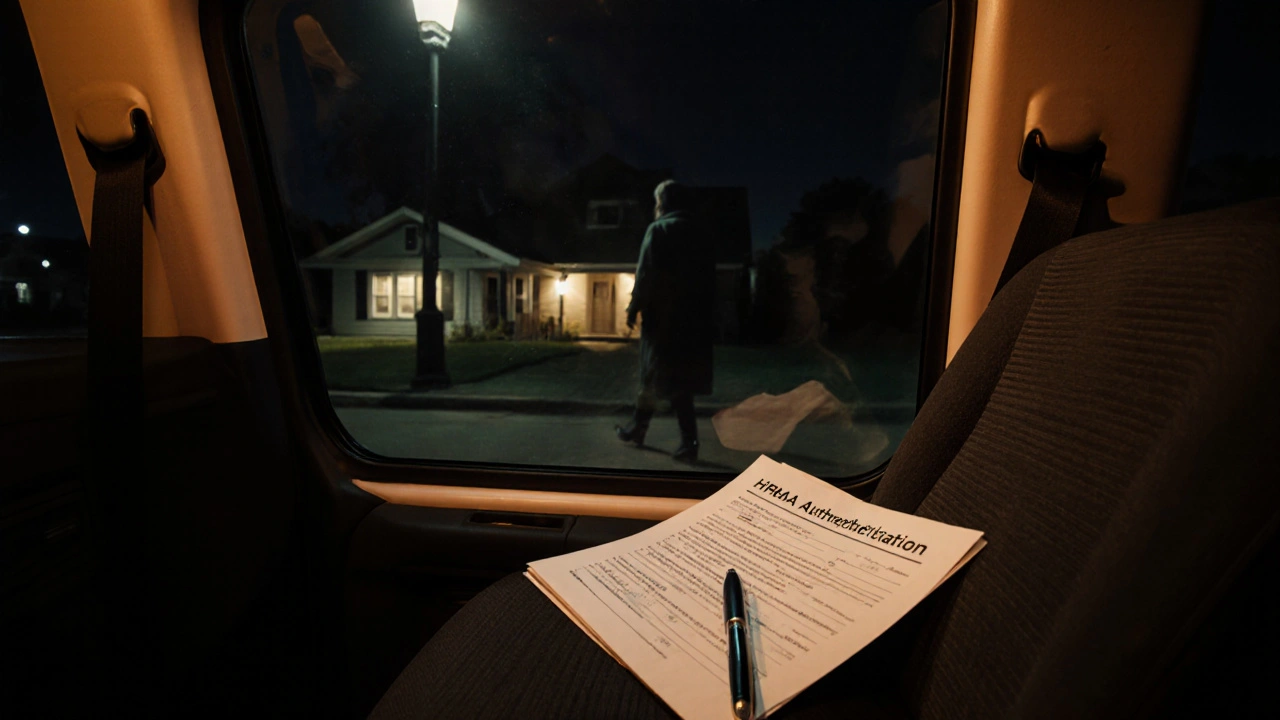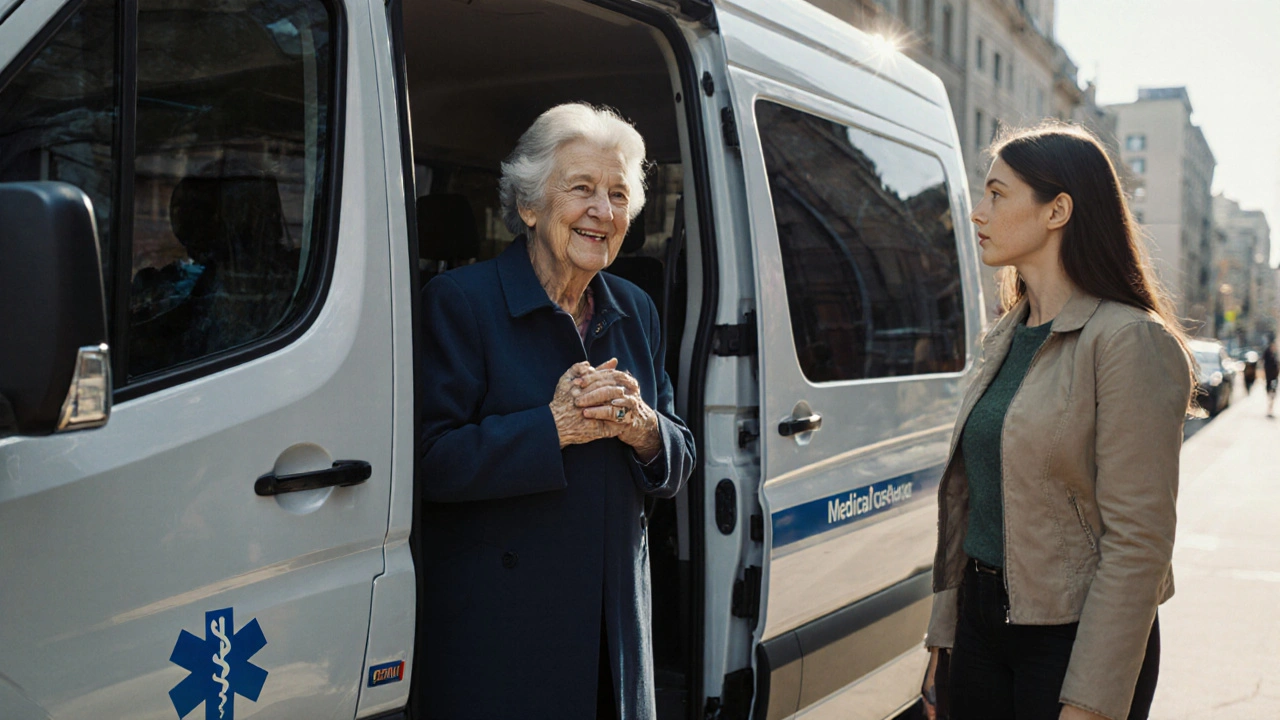When a medical escort service transports someone with a chronic illness, dementia, or after surgery, caregivers often want to know what’s happening. They’re worried. They want updates. But what can the escort team actually say? Under HIPAA, the rules aren’t always clear - and getting it wrong can mean serious legal trouble.
What HIPAA Actually Blocks
HIPAA - the Health Insurance Portability and Accountability Act - doesn’t stop all communication. It stops unauthorized disclosure of protected health information (PHI). That includes diagnoses, treatment plans, medications, lab results, or even the fact that someone is receiving medical care.
Let’s say a medical escort picks up a 78-year-old woman with congestive heart failure. Her daughter is waiting at the destination. The escort sees the patient’s chart: she’s on warfarin, her last INR was 4.2, and she’s been hospitalized twice this year. That’s PHI. The escort can’t say any of that to the daughter unless the patient signed a written authorization.
Even if the patient seems confused or unable to object, HIPAA doesn’t let family members assume access. A spouse doesn’t automatically get rights. A child doesn’t get access just because they pay the bills. The law is strict: no permission, no details.
What Medical Escorts Can Say - Without Breaking the Law
There’s a lot you can say - if you stick to the basics.
- “The patient arrived safely.”
- “They were calm during transport.”
- “They ate breakfast before we left.”
- “They seemed comfortable in the vehicle.”
These are non-medical observations. They don’t reveal health status. They’re like saying, “Your mom was wearing her blue coat and smiled when she saw you.” No PHI. No violation.
Some escort services use a “status code” system. For example:
- Green: Patient arrived safely, no issues.
- Yellow: Patient was tired, needed extra rest.
- Red: Patient had a medical event during transit - EMS was called.
This keeps communication simple, safe, and compliant. The caregiver knows something happened - without knowing what.
When Caregivers Are Authorized to Receive Info
There are three legal ways a caregiver can get medical details from a medical escort service:
- Written Authorization: The patient signs a HIPAA release form naming the caregiver. This is the most common and safest route. Forms should list exactly what info can be shared - not just “any information.”
- Personal Representative: If the patient is legally incapacitated (e.g., coma, advanced dementia), a court-appointed guardian or power of attorney can receive PHI. The escort service must verify legal documents before sharing anything.
- Minimal Necessary Disclosure: In emergencies, if the patient is unconscious and the caregiver is immediately involved in care, limited info can be shared - like “The patient had a drop in blood pressure during transfer.” But even then, only what’s needed to ensure safety.
Many escort services keep a folder on each patient with their HIPAA authorization on file. If it’s not there, they say nothing. No exceptions.

What Happens If You Break HIPAA?
Violating HIPAA isn’t just a warning. It’s a federal offense.
For a medical escort service, penalties can include:
- Fines from $100 to $50,000 per violation
- Loss of license or certification
- Criminal charges if the breach was intentional
- Lawsuits from patients or families
In 2023, a small medical transport company in Florida was fined $125,000 after a driver texted a patient’s diagnosis to a family member. The patient had never signed a release. The driver thought they were helping. The company lost its insurance coverage and shut down within six months.
It’s not worth the risk. Even one mistake can destroy a business.
How to Set Up HIPAA-Compliant Communication
Medical escort services that handle this well have systems in place.
Step 1: Get the form signed at intake. Don’t wait until the day of transport. Include the HIPAA authorization in your onboarding packet. Explain it clearly: “This lets your loved one receive updates about your care.”
Step 2: Train every staff member. Drivers, dispatchers, and office staff all need to know what’s allowed. Role-play scenarios: “What if the caregiver calls and says, ‘Is my mom okay?’” The answer: “I can confirm she arrived safely. For medical details, I need to check if we have authorization on file.”
Step 3: Use secure communication tools. Don’t use personal phones, texts, or unencrypted email. Use encrypted apps like Signal or HIPAA-compliant platforms like TigerConnect. Even if you’re sharing a status code, the channel matters.
Step 4: Document everything. If you share info, write down who asked, what was said, and when. If you don’t share info, write that down too. Paper trails protect you.
What Caregivers Should Do
If you’re the caregiver, don’t wait until the day of transport to ask for updates.
- Ask the patient to sign a HIPAA release before the first trip.
- Give the escort service your preferred contact method and how often you’d like updates.
- Respect the rules. If they say they can’t tell you why the patient is tired, they’re not being cold - they’re following the law.
- Ask if they use a status code system. It’s a sign they take privacy seriously.
Many families feel shut out. But the truth is, HIPAA protects the patient’s right to control their own information - even from those who love them most.

What About Emergencies?
Yes, there are exceptions. If a patient has a cardiac arrest during transport, the escort team will call 911. They’ll tell paramedics everything they need to know. That’s not a HIPAA violation - it’s life-saving.
After the emergency, if the patient survives and regains capacity, they must still sign a release before the escort service shares details with the caregiver. Even in a crisis, the law resets once the immediate danger passes.
Some services have a “family emergency protocol” - they’ll notify a pre-designated contact if the patient is hospitalized. But again, only if that person was named in writing ahead of time.
Why This Matters Beyond the Law
Patients with dementia or mental health conditions often fear being “talked about.” They don’t want their private struggles turned into family gossip. HIPAA gives them control.
When escort services respect these boundaries, patients feel safer. They’re more likely to accept care. They trust the system.
For caregivers, it’s frustrating. But the alternative - a system where anyone can share your loved one’s medical details - is worse. Imagine your diagnosis posted on a group chat. That’s what happens without HIPAA.
Good medical escort services don’t just move people. They protect them. That includes protecting their privacy.
Can a medical escort tell a caregiver if the patient took their medication?
No, unless the patient signed a HIPAA release that specifically allows sharing medication information. Even if the caregiver gave the meds to the escort, the fact that they were taken is still protected health information. The escort can say, “The patient was cooperative during the trip,” but not “They took their blood pressure pill.”
What if the patient can’t give consent because they’re confused?
If the patient lacks decision-making capacity and has no legal guardian, HIPAA still blocks sharing details with caregivers. The escort service must wait for a court-appointed representative or a durable power of attorney to present legal documents. Without that, they can only confirm safety and general well-being - not medical status.
Can a family member call the escort service to check on their loved one during transport?
Yes - but only if the patient previously authorized them. If no authorization exists, the escort service can confirm the trip is underway or completed, but cannot share any medical details. They might say, “The patient is en route and scheduled to arrive in 20 minutes,” but not “They’re having trouble breathing.”
Do HIPAA rules apply to non-medical escort services too?
Only if they’re acting as a covered entity under HIPAA. That means if the service is contracted by a hospital, clinic, or insurance provider - or if they handle medical records, medication, or clinical notes - then yes. Pure transportation companies without clinical involvement are not covered. But many medical escort services do handle PHI, so they must comply.
Can a caregiver request a copy of the patient’s medical records from the escort service?
No. Medical escort services are not healthcare providers and don’t maintain medical records. They may have transport logs or incident reports, but those are not the same as clinical records. The patient or their legal representative must request records from the hospital, doctor, or pharmacy directly.
Final Thought: Privacy Isn’t a Barrier - It’s the Foundation
Medical escort services aren’t trying to be cold or unhelpful. They’re following the law because the law exists to protect people when they’re most vulnerable.
When caregivers understand that, they stop seeing HIPAA as a wall. They see it as the reason their loved one can trust the system. And that trust? It’s what makes safe, dignified care possible.
